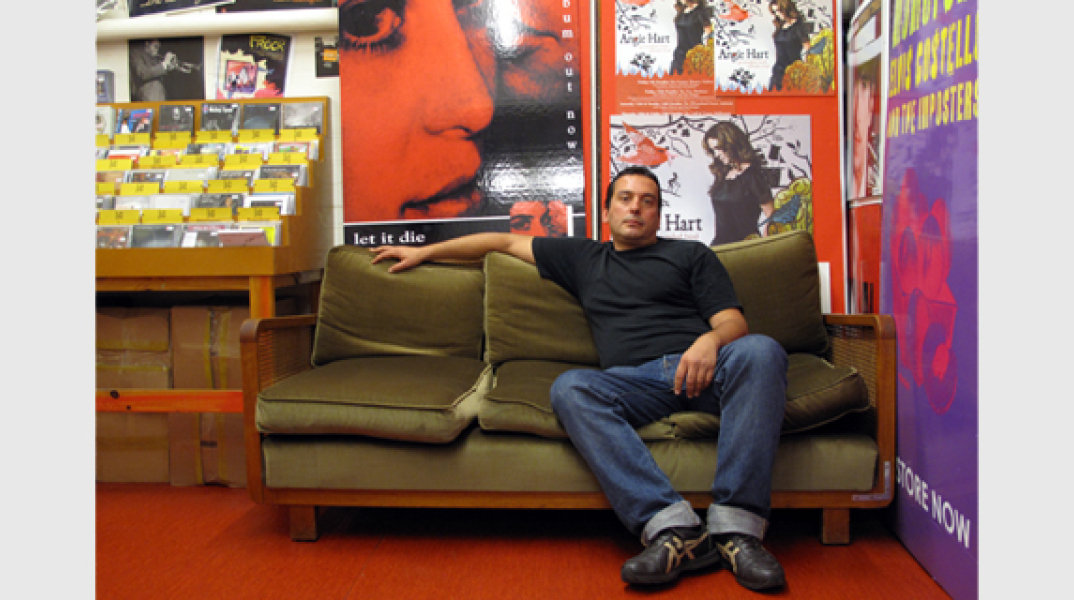
Φωτογραφία Zoe Ali (Scroll down to read the interview in English)
Έχει ήδη μπει στην προκριματική λίστα αυτών που θα αναμετρηθούν τον προσεχή Οκτώβριο για το υπέρτατο ευρωπαϊκό λογοτεχνικό βραβείο, το Man Booker Prize. Ανεξάρτητα από το αν θα τα καταφέρει ή όχι, ο Χρήστος Τσιόλκας είναι πλέον ένας ξακουστός ελληνοαυστραλός συγγραφέας, που έχει διαμορφώσει το ύφος του χάρη στη ματιά του μετανάστη.
Ένα κακομαθημένο πιτσιρίκι αναστατώνει ένα μπάρμπεκιου μεταξύ συγγενών και φίλων. Το περιστατικό θα σύρει τους εμπλεκόμενους στα δικαστήρια, θα κλονίσει ανεπανόρθωτα φιλίες, θα διαρραγούν σχέσεις, θα δοκιμαστούν αντρόγυνα, συγγένειες, φυλετικές ιδιαιτερότητες. Είναι «Το Χαστούκι» του Χρήστου Τσιόλκα, του ελληνοαυστραλού συγγραφέα που αποθεώνεται από τους κριτικούς και πραγματοποιεί σπουδαίες πωλήσεις. Αφηγούμενο σπονδυλωτά, μέσα από τις φωνές τεσσάρων ανδρών και τεσσάρων γυναικών, ηλικίας από τα 18 ώς τα 70, το «Χαστούκι» αποτελεί μια από τις πιο εύγλωττες αποτιμήσεις της σύγχρονης κοινωνίας και, όχι άδικα, διεκδικεί το βραβείο Booker. Ο δημιουργός του μας παραχώρησε μια συνέντευξη στην οποία δεν τσιγκουνεύτηκε τα λόγια του, επί παντός του επιστητού.
Έχοντας ήδη κερδίσει το βραβείο Κοινοπολιτείας, τώρα το «Χαστούκι» είναι υποψήφιο για το υψηλού πρεστίζ Booker Prize. Νιώθετε τη ζωή σας να αλλάζει δραματικά χάρη στα πρόσφατα τεκταινόμενα;
Είμαι πολύ τυχερός, αλλά όλα αυτά δεν είναι τίποτα παραπάνω από τη δυνατότητα να εξασκώ το γράψιμο σαν πλήρη απασχόληση.
Σας περνούσε από το μυαλό ποτέ πως γράφατε ένα μυθιστόρημα τόσο μαζικής αποδοχής;
Το προηγούμενο βιβλίο μου, η «Νεκρή Ευρώπη», με εξάντλησε. Μου πήρε καιρό, με πήγε σε ορισμένα πολύ σκοτεινά μέρη και με άφησε με την επιθυμία να επιστρέψω σε κάτι σύγχρονο. Κατ’ επέκταση, το «Χαστούκι» γράφτηκε ταχύτατα, σχεδόν απνευστί. Γενικά μιλώντας, πιστεύω πως μια από τις χειρότερες δοκιμασίες στις οποίες μπορεί να υποβάλει ένας συγγραφέας τον εαυτό του, είναι να προσπαθεί να μαντέψει τις προτιμήσεις των αναγνωστών. Μια ιστορία πρέπει να σε συνεπαίρνει πρώτα από όλα εσένα για να την αφηγηθείς πειθαρχημένα.
Αληθεύει η πληροφορία πως το περιστατικό που εκκινεί τη δράση του «Χαστουκιού» ήταν πραγματικό; Και ήταν άμεση η απόφασή σας να το μεταπλάσετε σε βιβλίο;
Ήταν μια πολύ ανάλαφρη στιγμή. Ήμουν σε ένα μπάρμπεκιου στους γονείς μου και το παιδί ενός φίλου συμπεριφερόταν ανεξέλεγκτα, τρέχοντας εδώ και εκεί, μπλέκοντας στα πόδια της μαμάς μου. Σε κάποιο σημείο, εκείνη του κατάφερε μια ανεπαίσθητη μπάτσα στον ποπό, οπότε εκείνος γύρισε τρομοκρατημένος για να δηλώσει: «Κανείς δεν έχει το δικαίωμα να αγγίξει το σώμα μου χωρίς την άδειά μου». Η μητέρα μου του απάντησε: «Αν είσαι άτακτος, θα σου τις βρέξω». Πρέπει να τονίσω ότι δεν ήταν καθόλου βίαιο περιστατικό, γελάσαμε όλοι, το αγοράκι ξεχάστηκε στο λεπτό. Όταν όμως επέστρεψα σπίτι, σκέφτηκα πως ήταν μια τέλεια αφορμή για να γραφτεί ένα βιβλίο.
Εννοείτε πως αποτέλεσε την ιδανική πλατφόρμα για να διοχετεύσετε τις ιδέες που θέλατε να περάσετε;
Πράγματι, γιατί ήθελα να γράψω ένα βιβλίο για τις σύγχρονες αξίες πολύ πριν το περιστατικό. Ήθελα να υπογραμμίσω τις κοινωνικές μεταμορφώσεις που έβλεπα στην Αυστραλία και, κυρίως, τον μετασχηματισμό της μπουρζουαζίας σε κάτι άλλο από αυτό που περιέγραφαν οι θεωρητικοί του 20ού αιώνα. Εθνολογικά, πολιτιστικά, οικονομικά, η αστική τάξη είναι πλέον κάτι άλλο. Το περιστατικό ήταν σαν δώρο. Μου έδωσε τον άξονα γύρω από τον οποίο να καδράρω τις ιδέες μου.
Χωρίς διάθεση υπεραπλούστευσης, θα έλεγα πως πέρα από τον μετασχηματισμό της αστικής τάξης, το «Χαστούκι» επιδιώκει να ρίξει φως στις φυλετικές εντάσεις μεταξύ των διάφορων εθνοτήτων. Πού βλέπετε να οδηγούνται τα πράγματα σε αυτό τον τομέα;
Επιτρέψτε μου να ξεκινήσω υπογραμμίζοντας πως το «Χαστούκι» είναι ένα αυστραλιανό βιβλίο που δεν καμώνεται πως μπορεί να αρθρώσει λόγο για όλο τον πλανήτη. Ανήκω σε μια γενιά συγγραφέων που έχει διαμορφωθεί μέσα από τη μετανάστευση και τον κοσμοπολιτισμό, και η οποία έχει κόψει τον ομφάλιο λώρο με την Ευρώπη ως κέντρο του κόσμου. Θεωρώ απαραίτητο να γράφουμε για τον καινούργιο κόσμο, προκειμένου να αποτελειώσουμε τον παλιό. Αυτή είναι η δύναμη του αμερικάνικου γραψίματος, καθώς και του λατινοαμερικάνικου. Φυσικά, χρησιμοποιώ την έκφραση «να αποτελειώσουμε» ως μεταφορά. Η ελληνική και ευρωπαϊκή κληρονομιά μου είναι αδιάσπαστη. Στην Αυστραλία διεξάγεται αυτή τη στιγμή μια αντιπαράθεση, σχετικά με το αν ο πολυεθνοτισμός ήταν επιτυχής ή όχι. Και γνωρίζω πως παρόμοιες συζητήσεις γίνονται και στην Ευρώπη. Για να χρησιμοποιήσω μια παροιμία, το να προσπαθείς να περιορίσεις τη φυλετική πρόσμειξη είναι σαν να κλείνεις τις πόρτες, όταν τα άλογα είναι ήδη έξω και καλπάζουν ελεύθερα. Η μετανάστευση έχει καθορίσει την Αυστραλία. Δεν μπορεί πια να γυρίσει πίσω. Τέτοιες ευχές είναι προϊόν ρατσιστικής νοσταλγίας. Οι προκλήσεις του πολυφυλετισμού, των συνόρων, των προσφύγων είναι παγκόσμιες. Οι κουλτούρες και οι τάξεις δεν είναι στατικές, μετασχηματίζονται ολοένα, ανταποκρινόμενες στις καπιταλιστικές και τεχνολογικές εξελίξεις. Αυτά υποστηρίζει το «Χαστούκι». Υποστηρίζει πως η μεσοαστική τάξη πραγμάτων δεν είναι πλέον Αγγλο-Κελτική και λευκή. Και πως η ταξινόμηση στη μέση ή την εργατική τάξη δεν είναι πλέον ζήτημα παραγωγικότητας, αλλά καταναλωτικής ευχέρειας. Πρόκειται για μεγάλες αλλαγές, τις οποίες ακόμα ψάχνουμε τρόπους να καταδείξουμε. Αυτός είναι ένας από τους λόγους που αγάπησα τόσο πολύ την ελληνική ταινία «Κυνόδοντας». Γιατί πραγματεύεται το πόσο αδύνατο είναι να αποστειρώσεις μια κοινωνία απομονώνοντάς την από την αναπόφευκτη αλλαγή.
Όντας ελληνικής καταγωγής ο ίδιος, πόσο μοιάζετε με τους ομογενείς χαρακτήρες των βιβλίων σας;
Η καταγωγή μου είναι η ιστορία μου, όχι ο χαρακτήρας μου. Νιώθω περισσότερο φίλος με τους Βιετναμεζο-αυστραλούς, ή τους Σερβο-αυστραλούς, ή τους Τουρκο-αυστραλούς φίλους από όσο με τους Ευρωπαίους και τους Έλληνες. Δεν υποτιμώ την ελληνικότητά μου. Αγαπώ την ελληνική ιστορία, τη μουσική, το γράψιμο. Όμως το κυριότερο στοιχείο καθορισμού ενός ατόμου είναι η γλώσσα, και σε αυτό το επίπεδο, οι επιδόσεις μου είναι λυπηρά ανεπαρκείς.
Ποιοι συγγραφείς σας διαμόρφωσαν ως συγγραφέα;
Οι μεγάλοι Αμερικάνοι των μέσων του 20ού αιώνα: Χένρι Μίλερ, Νόρμαν Μέιλερ, Τζον Άπνταϊκ, Φίλιπ Ροθ. Νομίζω πως το μεταναστευτικό υπόβαθρο της Αμερικής με έκανε να ανταποκριθώ σε τέτοιο βαθμό στους Αμερικανοεβραίους δεύτερης και τρίτης γενιάς, όπως ο Μέιλερ και ο Ροθ. Οι γονείς μου ήταν τυπικά μέλη της εργατικής τάξης, όμως έχοντας στερηθεί της ευκαιρίας να αποκτήσουν παιδεία, γνώριζαν τη σημασία της εκπαίδευσης, οπότε ενθάρρυναν την κλίση μου στη λογοτεχνία με κάθε τρόπο. Κάθε που πληρωνόταν τον μισθό του, ο πατέρας μου πήγαινε στο βιβλιοπωλείο και μου αγόραζε μυθιστορήματα. Καμιά φορά ήταν μετριότητες, άλλες φορές μπορεί να ήταν Ντίκενς ή Χένρι Μίλερ. Δεν πρόκειται να το ξεχάσω ποτέ αυτό. Βέβαια, ξεκινώντας από αυτή την κλίση, ώσπου να φτάσω στο σημείο να μπορώ να αποκαλώ τον εαυτό μου συγγραφέα χωρίς να ακούγομαι επαρμένος, μεσολάβησαν πολλά. Όμως αυτή η πείνα υπήρχε μέσα μου από νωρίς, και είμαι κακός στο να μην ικανοποιώ τις ορέξεις μου. Έπρεπε να γράψω. Οι αγαπημένοι μου συγγραφείς με ώθησαν σε αυτή την κατεύθυνση.
Θα θέλατε να μοιραστείτε τις σκέψεις σας για τη μετεξέλιξη της ύπαρξής μας σαν ψηφιακού πληθυσμού μέσα από μια κουστωδία δικτύων και συσκευών, από τα smartphones ώς τα κοινωνικά μίντια;
Διάβασα ένα σπουδαίο σχόλιο του συγγραφέα Τζόναθαν Φράνζεν, που ισχυρίστηκε πως οποιοσδήποτε ενδιαφέρεται στοιχειωδώς για το γράψιμο δεν πρέπει να διαθέτει σύνδεση στο ίντερνετ. Είναι τόσο εύκολο να χαθείς στον ψηφιακό κόσμο… Αυτή τη στιγμή είμαι μέλος της καμπάνιας υποστήριξης του Τζούλιαν Ασάνζ, του δημιουργού του wikileaks. Είναι αναντίρρητο πως τα ψηφιακά μίντια διαμορφώνουν τη σύγχρονη έκφραση και επικοινωνία. Είμαστε όλοι πιασμένοι σε αυτό το πλέγμα. Η ανησυχία μου αφορά την παθητική μας σχέση με την τεχνολογία, την αδυναμία να κάνουμε ένα βήμα πίσω και να επανακτήσουμε τον απαραίτητο φυσικό χώρο, τόσο σε ψυχολογικό όσο και σε σωματικό επίπεδο. Μήπως δείχνω την ηλικία μου με αυτά τα λεγόμενα; Πιστεύω, ωστόσο, πως δεν πρέπει να ξεχνάμε ότι το facebook, για παράδειγμα, δεν είναι κοινοτική αγαθοεργία, αλλά μια πανίσχυρη επιχείρηση, που ασκεί πολιτική και οικονομική εξουσία.
Παρακολουθείτε τα τεκταινόμενα στην Ελλάδα; Τη χρεοκοπημένη οικονομία, τα ποσοστά ανεργίας, τη συλλογική απελπισία;
Ναι, και γνωρίζω πως η Ελλάδα είναι σε κατάσταση σοκ. Πιστεύω επίσης πως οι Ελληνο-αυστραλοί αγνοούν ή επιλέγουν να αγνοούν τα γεγονότα. Τις προάλλες άκουσα δυο ηλικιωμένους Έλληνες σε ένα καφέ της Μελβούρνης να λένε, «απίστευτο, οι Έλληνες παραμένουν καλοπερασάκηδες, τίποτα δεν άλλαξε». Μου ήρθε να τους πω: «Μπράβο, ρε! Επιτέλους γίνατε Αυστραλοί!». Δυστυχώς, έχουμε φτάσει στο σημείο να αρνούμαστε να δεχτούμε πως η Ελλάδα έχει αλλάξει και μας αρέσει να τη φαντασιωνόμαστε στην Ντίσνεϊλαντ εκδοχή της. Θέλουμε να πηγαίνουμε πίσω στο πατρογονικό χωριό, να περιηγηθούμε από τους συγγενείς και να απωθήσουμε την πραγματικότητα όσο το δυνατόν μακριά μας.
Η Ελλάδα, και η Ευρώπη στο σύνολό της, καλλιεργούν μια αυξανόμενη δυσανεξία απέναντι στους μετανάστες, ενώ οι εθνικιστικές πολιτικές εξαπλώνονται μέρα με τη μέρα. Πιστεύετε πως πρόκειται για μια φυσιολογική αυτοάμυνα απέναντι στο άγνωστο; Ή για μια άκρως υποκριτική στάση, ιδιαίτερα από τη στιγμή που εμείς οι Έλληνες αποτελούμε έθνος μεταναστών;
Πρόκειται περί φόβου. Καθώς και της ειδεχθέστερης εθνικιστικής εκδήλωσης. Συμβαίνει και εδώ: ο φόβος για τον ξένο, τον απόκληρο, τον μετανάστη. Το βρίσκω φρικτό και ανάλγητο. Η μεγαλύτερη σύγχρονη ευρωπαϊκή πρόκληση είναι η εξής: Θα καταφέρει η ευρωπαϊκότητα να μεταφερθεί στο επίπεδο της υπηκοότητας αντί της καταγωγής; Θα μπορέσει, λόγου χάρη, ο Ιμπραήμ Χαντάντ, ένα παιδί γεννημένο στην Ελλάδα από Ιρακινούς γονείς, να θεωρηθεί τόσο Έλληνας όσο είμαι εγώ Αυστραλός; Θέλω να το δω να συμβαίνει. Θέλω να διαβάσω στο μέλλον ένα μυθιστόρημα γραμμένο στα ελληνικά από τον Ιμπραήμ Χαντάντ ή την Νάντια Καρζίκ. Με τον ίδιο τρόπο που ο Σαλμάν Ρουσντί και ο Χανίφ Κιουρέισι μετασχημάτισαν την αγγλοσαξονική νουβέλα, θέλω να πραγματοποιηθεί κάτι παρόμοιο και στην υπόλοιπη Ευρώπη.
*«Το Χαστούκι», κυκλοφορεί από τις εκδόσεις Ωκεανίδα, σε μετάφραση του Βασίλη Κιμούλη.
Christos Tsiolkas talks to Dimitris Karathanos (SOUL magazine)
Already a winner of the Commonwealth writer’s prize, now “The Slap” is nominated for the highly prestigious Booker. Is this a novel that will change your life decidedly? Not in terms of becoming a celebrity, but that from now on, you will be able to schedule your own work hours and focus better on writing?
I consider myself very fortunate. The success of The Slap has brought me a certain level of economic security that I’ve not had before. It means for the first time in my life I can work on writing full-time. As I said, I feel very very fortunate.
Did you have in mind when writing that this was going to be a novel that could make such a huge impression?
No. The novel before this, Dead Europe, was a difficult novel to write, exhausting really. It took me a long time, led me into some dark places and after finishing it I wanted to write something contemporary. In hindsight The Slap was written relatively quickly, in an almost breathless rush of writing. I think one of the worst things a writer can do to themselves is to start trying to predict what it is that people want to read. I don’t know how you can be honest in your work if you this. I have to be obsessed with a story or an idea or a character before I can start to write. Without this obsession it is so difficult to maintain the discipline and work required.
Is it true that the incident that sparks the action in the novel was actually a true one that you had happened to witness? Was it an instant decision to transform it into a novel?
It was a very light moment. I was at a bbq at my parents and there was a friend’s young son who was being a little out of control, running in and out of my mother’s feet, not listening to her as she was trying to cook all this food. At one point she gently gave him a pat on his bottom, and he turned around horrified, and said “No one has the right to touch my body without my permission”. My mother replied, “I you are naughty, I smack you.” I have to stress it was not at all a violent moment, we all laughed, the boy forgot it in an instance. But returning home I thought, this is a perfect way to start the novel.
But I had been thinking about wanting to write a novel about contemporary mores and values long before the actual incidence. I had wanted to write a novel that was about transformations in class that I was seeing all around me in Australia, about how the bourgeois class was no longer the class described by twentieth century theorists and academics (or the working class for that matter). Ethnically, culturally, economically it was something else. The incident was like a gift. It gave me a pivot around which to frame the story I wanted to tell.
Without intention to oversimplify, I would say that “The Slap” is very much a book about the way middle classes and the direction their ethical values are taking, as well as the tensions between multicultural groups. Where do you see this whole thing leading our societies in the future?
Let me begin answering that question by saying first that The Slap is an Australian novel and I don’t want to pretend that I can speak across all cultures. I think that in being a novel that does not look for legitimacy to Europe, to the UK or Greece for example, is something new. I think I am part of a generation of writers and artists in Australia now who has been formed through multiculturalism and migration, who no longer sees Europe as the centre (if you like Dead Europe was my attempt to finally sever that umbilical cord). I think it is crucial for writing in the so-called “new world” to kill the “old world”. That is the strength of US writing, of so much Latin American writing. Of course I am using the expression “to kill” as a metaphor and of course the relationship can never completely disappear. My Greek and European heritage, for example, is part of me. There is a debate raging in Australia about whether multiculturalism has been a success or not, and I know similar debates are raging in Europe. But in Australia, to use an old English saying, to try and limit multiculturalism is a little like closing the gates after the horses have bolted. Migration has transformed Australia, you can’t go back to “before multiculturalism”. That wish is now an exhausted racist nostalgia. I think this is partly what has generated interest in The Slap.
The challenges of multiculturalism, the challenges of borders, refugees, migrants are global. Culture and class are not static, they are always mutating, responding to the acceleration of capitalism and technology. This is the moment of The Slap, where the bourgeois middle-class order is no longer Anglo-Celtic and white, where questions of what it means to be working-class or to be middle-class have more to do with consumerism than questions of production. This is a huge change, and one that I think we are still finding our way of expressing, of communicating. This is one of the reasons I so loved the Greek film, Dogtooth, by Yorgos Lanthimos. I saw that film as being all about trying to contain and manage culture, about how impossible it is to finally insulate culture form the transformative speed of what is happening all around us. Are the protests now in Greece a working-class protest or a middle-class protest? Do such terms make sense anymore? We need literature that is not beholden to nostalgia. I hope whatever the good or bad about my novel, The Slap, that it is not beholden to nostalgia.
Being of Greek ancestry yourself, where you raised the same way your characters are?
Yes. So the Greek ancestry is important but my real background is migration rather than an ethnicity or a nationalism. I feel more in common with my Vietnamese- Australian or Serbian-Australian or Turkish-Australian friends than I do with a European Greek. I once wrote that my nationality is the hyphen, the hyphen between Greek-Australian. Maybe that is not my nationality, maybe that is my history.
That isn’t to say that my “Greekness” isn’t important. It is and it manifests itself through my love of Greek music and history, of Greek writing, of my love for my family in Greece. All of this is important. But I think language is crucial for the sense of who one is and my Greek is pitifully inadequate. It is in using the Greek language that I become other.
Which books sparked your desire to become a writer? And how difficult the obstacles towards that direction?
The great mid-twentieth century US novelists, writers such as James Baldwin, Carson McCullers, Henry Miller, Norman Mailer, John Updike, Phillip Roth, Ralph Ellison. I think the migration history in the US made me respond to the writing of many of these second and third generation Jewish US writers i.e. Mailer, Roth. I also think that there is a sense of Australia being far away from the world, a country that is highly urbanized but surrounded by this vast outback, this vast desert and wilderness, so I responded to writing from the southern USA, which I think shares some of this sense of being isolated, far from the centre.
Then I was very fortunate to have an English teacher in middle-high schoo, a Czech refugee who fled Czechoslavakia after 1968 and who introduced me to European writers, to Stendhal and to the Russians, to Flaubert, to Gide. I also at that age started to discover the Greeks: Kazantazakis, Cavafy, Ritsos. All of these became part of my literary heritage.
My parents were workers, they were and are working-class people. But like so many migrants they knew the importance of education (and partly because they came from a Greece that denied such opportunities to people like them) and so they always encouraged my love of literature. Every payday my father would go to a bookstore and buy me books. I always remember that. Sometimes it would be trash, sometimes it would be Dickens, it would be Henry Miller.
Of course, to pursue a life as a writer is not necessarily easy, not something you can assume coming from the background I did. It took a long time for me to say the phrase “I am a writer” without feeling false or pretentious. But that hunger was in me early. I am bad at not satisfying my appetites. I had to write. The writers I loved pointed me towards that direction.
I also have to mention the radical sexual subversiveness of writers like Jean Genet, of John Rechy, of Kathy Acker, and of indeed Hnery Miller. They taught me to be unafraid. That is an important lesson.
Would you say there's a laziness now in how we read? That reading has become an affirmation of who we are, rather than for a challenge of who we are? And if yes, do you foresee this tendency changing in the future?
Political correctness, the desire for safe, clean, pacifist writing makes me furious. The novels I love best are the ones that shake me up, destabilize me, upset my prejudices and points of view. I see little of that in the contemporary novel. I ant more sinew, more blood, more life in the novel. There are too many pretty words. Will this change? I think the question to ask is what novels have you read in the last few years that have made you sit up and take notice, that have said something about the confusion, terror and change of contemporary life? If that is a question that is difficult to answer then I think we writers have abrogated one of the most important parts of what we do.
Would you like to share your thoughts on our contemporary existence as digitalized populations through an array of services and gadgets, from the iPhone to the social networks?
I read a great comment from the US writer, Jonathon Franzen, who said that anyone serious about writing cannot have an internet connection. I think it is so easy to get lost in the digital world and find in the end that you have not spent any of your time doing real writing, real work. That is something I am quite mindful of.
At the moment I am writing this I have been part of a campaign protesting what has been happening to Julian Assange, the creator of wikileaks. I think it is undeniable that new media technologies are transforming communications and cultural expression. We are all part of this matrix, this nextwork of technology. My concern is that so many of us have a passive relationship to the technology, that it mutates so fast that we are unable to step back and ask questions of it. I think that this stepping back is important, the reclaiming of space, both physical and temporal, away from the digital world.
Maybe I am showing my age? But I think it is always worth remembering that facebook, for example, is not some benign community service, it is a corporation, that power, politics and economics do not disappear on the web, they are still at play.
Do you follow the reports from Greece? The bankrupt economy, the unemployment rates, the collective desperation?
Yes, I think Greece is in a state of shock. And I think that Greek-Australians are largely ignorant of what is happening, or choose to ignore it. Just the other day I heard two old Greek men talking in a café around the corner from where I live in Melbourne and they were saying, “don’t believe it, they Greeks are still living the good life, nothing has changed”. I wanted to go over to them and say, “Bravo thei, epitelos eiste Australoi!” I mean by this that for so long Greeks have thought of us Greek-Australians as being backward, remnants of an old mid-XXth century Greece, and I think we in Australia are now in turn doing the same to European Greeks, refusing to see that Greece has itself changed.
I think when Greek-Australians go to Greece they experience the Disneyland version of Greece – they go back to the ancestral village, they are taken out by their relatives and shown a good time, they are kept protected from the realties of what is really occurring in the country.
Greece, and Europe in general, is cultivating a gradually increasing distrust towards immigrant populations and right wing parties are gaining voters by the day. Do you think this is a natural defensive measure towards the unknown? Or rather a hideous stance, since we Greeks in particular are a nation of immigrants?
It is fear. And it is the most ugly manifestation of nationalism. It is occurring here as well, the fear of the outsider, the refugee, the migrant. There is something hideous in the callousness of such fears. It is the great challenge facing Europe I think, can Europeaness be defined by citizenship rather than cultural ancestry? Is a Greek called Ibrahim Hadad, say, a Greek born child of Iraqi migrants, will he be seen as a true Greek in the same way that I, a child of Greek immigrants to Australia, am seen as a true Australian? I want that to be possible. I want to read a Greek novel in the future by Ibrahim Hadad or by a Nadja Carjik. Just as a Salman Rusdie or a Hanif Karushi have transformed the English-language novel, I am waiting for the European novel to be transformed in this way.
How would you describe Australia in a few words? Why do we know so little about this vast country?
It can be parochial and paranoid and anti-intellectual. It can also be forward thinking. It is my country and when I am away from it I miss its landscape, the light, the bush, the desert and the ocean. I like Melbourne as well, but it is impossible to judge as it is my home town and I lack objectivity. But I do like the mix of people, it is the most “multicultural” part of Australia.
But, I think there is an increasing lack of generosity and kindness in Australia. I love New Zealand. I think that they do not have that self-consciousness about being a small country that Australia has: they have stood up to the USA when it counts, they have a stronger model and history of reconciliation with their Indigenous people, I think they are kinder. I wish we were more like New Zealanders.
How is your life these days? And what plans do you have for the near future?
I feel very fortunate. At the moment work has begun on the making of the TV series based on The Slap and I am half-way through my new novel.




























